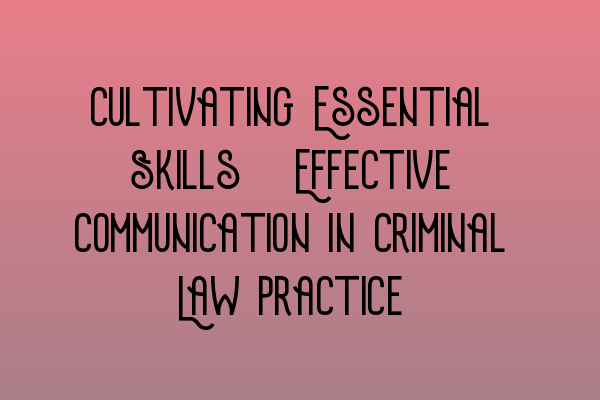Cultivating Essential Skills: Effective Communication in Criminal Law Practice
Effective communication is an indispensable skill for criminal law practitioners. In order to succeed in representing clients and advocating for justice, it is crucial to master the art of communication. This blog post will explore the essential skills needed for effective communication in the field of criminal law practice and provide practical tips on how to cultivate them.
Active Listening
The first step towards effective communication is active listening. By actively listening to clients, witnesses, and colleagues, you demonstrate empathy and gain valuable insights. This allows you to understand the nuances of their experiences, emotions, and perspectives, which in turn helps you build stronger cases and develop more persuasive arguments in court.
Read our LLC Formation Made Simple: Step-by-Step Guide for UK Entrepreneurs article for more information on understanding legal formations.
Effective Verbal Communication
When it comes to criminal law practice, verbal communication plays a crucial role. As a solicitor, your ability to articulate legal concepts clearly and convincingly to clients, judges, and juries is vital. It is important to use language that is accessible and avoids unnecessary jargon, ensuring that your message is comprehensible to all parties involved.
For a comprehensive overview of business regulations in the UK, consult our Business Regulations in the UK: A Comprehensive Overview article.
Written Communication Skills
In addition to verbal communication, written communication skills are equally important in criminal law practice. Drafting clear, concise, and persuasive legal documents such as pleadings, motions, and legal opinions is essential. Your ability to convey complex legal arguments and ideas in writing will contribute to your success as a solicitor in criminal law.
To accelerate your exam preparation for the SQE, consider attending our SQE Workshops and Webinars: Accelerate Your Exam Preparation.
Non-Verbal Communication
Non-verbal communication, such as facial expressions, gestures, and body language, can have a significant impact on the outcomes of criminal cases. Non-verbal cues can convey sincerity, credibility, and confidence, helping you build rapport with clients, judges, and juries. Pay close attention to your own non-verbal cues and practice reading and interpreting the cues of others.
For key insights and practices in Delaware corporate law that may be relevant to your criminal law practice, explore our article on Delaware Corporate Law for UK Solicitors: Key Insights and Practices.
Empathy and Emotional Intelligence
Empathy and emotional intelligence are critical attributes for effective communication in criminal law practice. Understanding and acknowledging the emotions of clients, witnesses, and even opposing counsel can help you navigate difficult situations and build trusting relationships. Developing these skills will enable you to provide compassionate and effective legal representation.
For a better understanding of the solicitors qualifying examination format, read our article on Demystifying the Solicitors Qualifying Examination Format.
Conclusion
Mastering the art of effective communication is essential for success in criminal law practice. By actively listening, honing your verbal and written communication skills, understanding non-verbal cues, and developing empathy and emotional intelligence, you can become a more persuasive and empathetic advocate for your clients.
For more information and resources on criminal law practice, visit our website at https://sqecriminallaw.co.uk.
- LLC Formation Made Simple: Step-by-Step Guide for UK Entrepreneurs
- Business Regulations in the UK: A Comprehensive Overview
- SQE Workshops and Webinars: Accelerate Your Exam Preparation
- Delaware Corporate Law for UK Solicitors: Key Insights and Practices
- Demystifying the Solicitors Qualifying Examination Format
